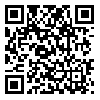Volume 10, Issue 1 (2022 2022)
JRH 2022, 10(1): 46-54 |
Back to browse issues page
Download citation:
BibTeX | RIS | EndNote | Medlars | ProCite | Reference Manager | RefWorks
Send citation to:



BibTeX | RIS | EndNote | Medlars | ProCite | Reference Manager | RefWorks
Send citation to:
Ashabi S A, Firouzbakht M. Relationship between Religiosity with Meaning of Life and Spiritual Health of Students of Islamic Azad University, Babol Branch, Iran, During the COVID-19 Outbreak. JRH 2022; 10 (1) :46-54
URL: http://jrh.mazums.ac.ir/article-1-910-en.html
URL: http://jrh.mazums.ac.ir/article-1-910-en.html
Department of Philosophy, Babol Branch, Islamic Azad University, Babol, Iran
Abstract: (2584 Views)
Background and Purpose: Today, the consequences of the spread of COVID-19 on the religious aspect of human life is one of the discussing areas. Therefore, the present study aimed to assess the relationship between religiosity and the meaning of life, and the spiritual health of the students of Islamic Azad University of Babol during the COVID-19 period.
Materials and Methods: The statistical sample in this descriptive-correlational study included 330 students in the Islamic Azad University, Babol Branch, Babol, Iran, in the academic year 2019-2019 in the age range of 20-29 years, who were selected through simple random sampling method and the questionnaire link has been sent to them through online social networks. Data were collected through standard questionnaires, including Polotzin and Ellison's spiritual health questionnaire (1983), Steger’s Meaning in Life Questionnaire (MLQ, 2006), and Khodayari Fard et al.’s religiosity measurement scale (2015). The data were analyzed using SPSS software (version 26) through descriptive statistics, the Pearson correlation coefficient, and focal regression. All ethical considerations have been observed in this study and the authors have not reported any conflict of interest.
Results: The findings showed a positive and significant relationship between religiosity with the meaningfulness of life and spiritual health in students. The effect of religiosity on the meaningfulness of students’ lives and spiritual health was found to be 0.651 and 0.552, respectively.
Conclusion: Targeting the meaningfulness of life and spiritual health through religious and spiritual interventions can be effective in improving the meaningfulness of life and spiritual health of students during the COVID-19 epidemic.
Materials and Methods: The statistical sample in this descriptive-correlational study included 330 students in the Islamic Azad University, Babol Branch, Babol, Iran, in the academic year 2019-2019 in the age range of 20-29 years, who were selected through simple random sampling method and the questionnaire link has been sent to them through online social networks. Data were collected through standard questionnaires, including Polotzin and Ellison's spiritual health questionnaire (1983), Steger’s Meaning in Life Questionnaire (MLQ, 2006), and Khodayari Fard et al.’s religiosity measurement scale (2015). The data were analyzed using SPSS software (version 26) through descriptive statistics, the Pearson correlation coefficient, and focal regression. All ethical considerations have been observed in this study and the authors have not reported any conflict of interest.
Results: The findings showed a positive and significant relationship between religiosity with the meaningfulness of life and spiritual health in students. The effect of religiosity on the meaningfulness of students’ lives and spiritual health was found to be 0.651 and 0.552, respectively.
Conclusion: Targeting the meaningfulness of life and spiritual health through religious and spiritual interventions can be effective in improving the meaningfulness of life and spiritual health of students during the COVID-19 epidemic.
Type of Study: Original Research |
Subject:
Islamic Psycology
Send email to the article author
| Rights and permissions | |
 |
This work is licensed under a Creative Commons Attribution-NonCommercial 4.0 International License. |






